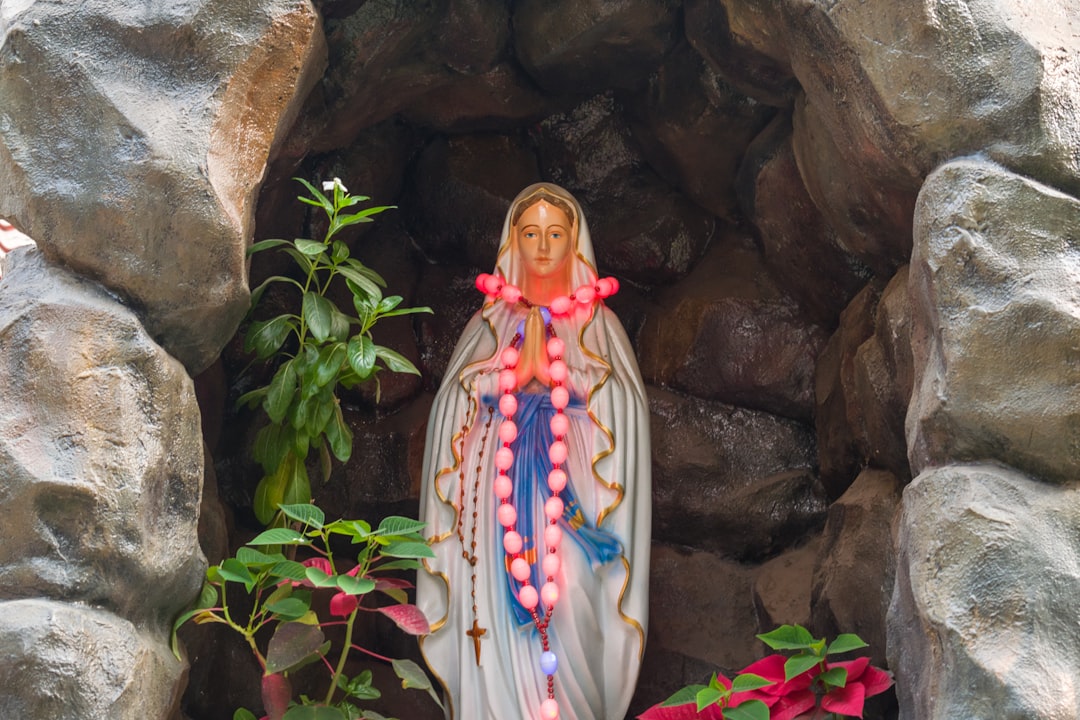The Bible is known for its many intriguing characters, and Herodias is no exception. Who was this controversial figure and what role did she play in biblical history? In this blog post, we’ll dive deep into Herodias’ story, exploring the fascinating historical and political context surrounding her life, the moral challenges she faced, and the legacy that she left behind. Keep reading to discover more about this complex and intriguing figure from the pages of the Bible.
The Historical and Political Context of Herodias in the Bible

When it comes to understanding the enigmatic character of Herodias in the Bible, it is helpful to first examine the historical and political context in which she lived. Herodias was part of the Herodian dynasty, a family of Jewish rulers who were appointed by the Roman Empire to oversee the regions of Judea and Galilee.
Herodias herself was the daughter of Aristobulus IV, a member of the royal family who was executed by Herod the Great, the grandfather of Herodias’ husband, Herod Antipas. Herod Antipas was a tetrarch, or a regional leader, who ruled over Galilee and Perea during the time of Jesus and John the Baptist.

As a member of the Herodian family, Herodias was no stranger to political intrigue and family relationships that were both complicated and tenuous. Her marriage to Herod Antipas was a strategic move to solidify alliances and consolidate political power. However, Herodias’ position as a woman in a patriarchal society meant that she had limited agency and was often at the mercy of the men in her life.
Furthermore, Herodias lived in a time of great religious and social upheaval. The Jewish people were under Roman occupation and struggled to maintain their cultural and religious identity. John the Baptist, a charismatic prophet who baptized people in the Jordan River, was a voice calling for repentance and holiness. His message gained popularity and challenged the religious and political authorities of the time, including Herod and Herodias.
In this context, the biblical account of Herodias takes on greater significance. It is not just a story of personal drama and moral failings, but a window into the complexities of life in the first century. By understanding the historical and political context of Herodias, we can gain a deeper appreciation for the challenges and opportunities that faced biblical characters like her.
In summary, the historical and political context in which Herodias lived was complex and nuanced. Her status as a member of the Herodian family and a woman in a patriarchal society, as well as the religious and social context of her time, all played a role in shaping her story. By keeping this context in mind, we can better understand the character of Herodias as well as the broader themes of the Bible.
Herod Antipas: The Man Behind the Throne
To understand Herodias’ story in the Bible, one must first look into the historical and political context of the time. Herod Antipas, the son of King Herod, ruled over Galilee and Perea from 4 BC to 39 AD during the Roman occupation of Judea. He was known for his cunning political maneuvering and his lavish lifestyle.
Herod Antipas was a man driven by power and luxury. He built palaces, fortresses, and cities, including the infamous city of Tiberias. He was notorious for his immoral behavior, including his marriage to Herodias, who was his brother’s wife. This scandalous union is what led to the confrontation with John the Baptist and ultimately, to Herodias’ appearance in the Bible.
As a ruler, Herod Antipas had to tread carefully between the Jewish religious leaders and his Roman overlords. He was cautious about any potential threats to his power, and that is why he was troubled by John the Baptist’s criticism of his marriage to Herodias. When Herodias’ daughter, Salome, danced for him at a banquet, he was so impressed that he offered her anything she wanted. Coached by her mother, Salome asked for the head of John the Baptist on a platter.
Herod Antipas was reluctant to fulfill the request, but he could not go back on his word in front of his guests. His decision to execute John the Baptist was unjust, and it haunted him for the rest of his life. This event revealed the depths of Herod Antipas’ moral depravity and exposed the political intrigue of the time.
In conclusion, Herod Antipas was a complex figure in the New Testament, whose actions were shaped by his desire for power and luxury. His involvement with Herodias and his role in the execution of John the Baptist illustrate the dangerous and corrupt nature of those in power during that time.
The Dance that Launched a Thousand Stories

When we think of Herodias in the Bible, the image that often comes to mind involves a dance, a banquet, and a head on a platter. This dramatic scene has been depicted in countless works of art and literature. But what exactly happened that fateful night?
According to the New Testament, Herod Antipas threw a banquet for his officials and military commanders. During the festivities, his stepdaughter, Salome, performed a dance that pleased Herod and his guests. In gratitude, Herod offered to give her anything she desired, up to half his kingdom.
Salome sought the advice of her mother, Herodias, who had a grudge against John the Baptist for publicly speaking out against her marriage to Herod. Herodias told Salome to ask for John’s head on a platter.
Herod, who had been reluctant to execute John, was now faced with a moral dilemma. He had made a promise in front of his guests, and he did not want to break it. At the same time, he did not want to anger God by killing a prophet.
In the end, Herod gave in to Herodias and ordered the execution of John the Baptist. This event would have far-reaching consequences not only for Herodias, but for Herod and his entire family as well.
The story of the dance of Salome has captured the imagination of artists and writers for centuries. Some have portrayed Salome as a seductress, wielding her feminine wiles to get what she wanted. Others have presented her as a victim, forced to obey her mother’s commands.
« Discovering the Story of Azariah in the Bible
Saved by Grace: Understanding the Power of Divine Love. »
In the end, the truth is likely somewhere in between. Salome was a young girl caught up in the political intrigue and religious beliefs of her time. She was manipulated by those around her, and her actions had tragic consequences.
As Christians, we can learn from the story of Herodias and her daughter. We can see the dangers of political power and the importance of moral courage. We can also see the complexity of family relationships and the consequences that come from making choices based on revenge and anger.
In the end, the story of Herodias and Salome is a reminder that biblical characters are not one-dimensional. They are complex individuals with their own motivations and struggles. As we read their stories, we are invited to reflect on our own lives and choices, and to seek wisdom and guidance from the scriptures.
Here are some key takeaways from the story of the Dance of Salome:
- Even in the midst of political power, moral courage is important
- Choices made with revenge and anger often have tragic consequences
- Family relationships can be complicated and have far-reaching effects
- Biblical characters are not one-dimensional and should be understood in context
John the Baptist and the Moral Challenge to Herodias

Herodias in the Bible is best known for her role in the execution of John the Baptist. John was a popular preacher and prophet who had gained a large following in Judea and Galilee. Herod Antipas, ruler of Galilee and Perea, had initially been intrigued by John’s message and had even invited him to his court. However, John soon began to criticize Herod’s personal life, particularly his marriage to Herodias.
According to the New Testament, Herodias was originally married to Herod’s half-brother Philip. However, she left Philip to marry Herod, which was seen as a violation of Jewish law. John the Baptist openly condemned this relationship, calling it sinful and immoral.
Herodias was furious with John and wanted to have him killed. However, Herod was initially reluctant to do so because he knew that John was popular with the people. Eventually, Herodias found an opportunity to have John arrested after Herod threw a lavish banquet in honor of his birthday. At the banquet, Herodias’s daughter Salome performed a dance that pleased Herod, and he promised to give her anything she wanted. Salome consulted with her mother, who instructed her to ask for John’s head on a platter. Herod, bound by his promise, had John executed.
This story raises many moral questions. Was Herod right to order John’s execution? Should Herod have gone against his promise to Salome in order to spare John’s life? Was Herodias purely motivated by a desire for revenge, or did she genuinely believe that John’s teachings were dangerous to society?
The interpretation of this story has varied throughout Christian history. Some have seen John’s execution as a tragic example of the dangers of political intrigue and the corrupting influence of power. Others have viewed John as a martyr who died for his commitment to truth and justice. Some have even criticized Herodias for her role in the execution, seeing her as a symbol of sin and immorality.

Regardless of how we interpret this story, it raises important questions about morality and ethics, as well as the relationship between religion and politics. These are issues that continue to resonate today, and that require thoughtful reflection and discussion.
The Execution of John the Baptist: Justice or Injustice?
After John the Baptist denounced Herodias’ marriage to Herod Antipas on the grounds that it was incestuous, Herodias sought revenge. In what is one of the most disturbing stories in the Bible, Herodias’ daughter Salome performed a dance at Herod’s banquet that so pleased him, he promised to give her whatever she wanted. Salome, prompted by her mother, requested the head of John the Baptist on a platter.
Many have debated the morality of Herod’s decision to execute John the Baptist. On the one hand, Herod was a political leader, and John’s denunciation of his marriage to Herodias could be seen as a threat to his power and stability. On the other hand, John was a respected religious figure, and his execution could be seen as a violation of the religious beliefs and traditions of the Jewish people.
Biblical commentary on the execution of John the Baptist often focuses on the conflicting loyalties of Herod and the moral implications of his decision. Some commentators view Herod as a morally weak leader who was unable to resist the manipulations of Herodias and her daughter. Others see him as a shrewd political actor who recognized the potential threat that John posed to his reign.

Regardless of one’s interpretation of the story, the execution of John the Baptist serves as a powerful reminder of the consequences of political intrigue and the dangers of violating religious beliefs. It also highlights the complicated family relationships that were common in the biblical era, as well as the role of prophecy and divine intervention in shaping historical events.
As Christians, we can learn from Herodias’ story that our actions have consequences, and that even powerful leaders are not immune to moral and ethical considerations. We can also reflect on the importance of standing up for what we believe in, even in the face of formidable opposition.
In summary, the execution of John the Baptist was a tragic event that continues to generate debate and reflection among biblical scholars and believers alike. By examining the historical, cultural, and religious context of this story, we can deepen our understanding of the complexities of biblical women and other historical figures, and draw valuable lessons about morality, justice, and the nature of power.
List of Key Points:
- John the Baptist’s denunciation of Herodias’ marriage to Herod Antipas was seen as a threat to his power and stability
- John’s execution could be seen as a violation of the religious beliefs and traditions of the Jewish people
- Biblical commentary on the execution of John the Baptist often focuses on the conflicting loyalties of Herod and the moral implications of his decision
- Herodias’ story highlights the importance of standing up for what we believe in, even in the face of formidable opposition
- Christians can draw valuable lessons about morality, justice, and the nature of power from this tragic event.
Biblical Commentary on Herodias: Sinful Woman or Tragic Victim?
Many biblical scholars have debated the character of Herodias in the New Testament. Some view her as a sinful and power-hungry woman, while others see her as a tragic victim of the political intrigue and family dynamics of the time. Let’s explore these two viewpoints in more detail.

On one hand, Herodias is often portrayed as a cunning and immoral woman who sought to maintain her hold on power through any means necessary. Her marriage to Herod Antipas, her uncle, was considered scandalous by Jewish law and she is often criticized for her role in John the Baptist’s execution. Some religious commentators paint Herodias as a woman driven by selfish ambition and a willingness to use her own daughter as a pawn in her schemes.
On the other hand, others see Herodias as a woman caught in the web of the Herodian dynasty and its complex family relationships. Herodias may have been forced into an unwanted marriage with Herod Antipas, as was the custom of the time. Additionally, she may have felt pressure to protect her position and the safety of her daughter amid the political turmoil of Judea and Galilee. Scholars suggest that her infamous demand for John’s head may have been a calculated move to appease Herod and solidify her own power.
Regardless of whether one views Herodias as a sinner or a victim, her story is a powerful reminder of the moral complexity of biblical stories. The actions of even the most notorious and reviled characters in the Bible cannot be easily reduced to black and white judgments of right and wrong. As with any historical figures, it’s important to examine the cultural and political context in which they lived to fully understand their actions.
Moreover, Herodias’ story highlights the role of women in the Bible. Women played a significant role in Jewish history, even if their stories are not always told in detail. Herodias may be remembered as the woman who orchestrated the beheading of John the Baptist, but she is also one of the few named women in the New Testament. Her legacy serves as a reminder of the importance of recognizing the experiences and perspectives of women in the biblical record.
In conclusion, the debate over whether Herodias was a sinful woman or a tragic victim underscores the complex nature of her character. As we explore her story and other biblical tales, we are reminded of the importance of understanding the historical and cultural context in which these characters lived. Herodias’ legacy serves as a reminder of the moral and ethical challenges we face in our own lives and the importance of empathy and understanding when interpreting biblical stories.
Herodias’ Legacy: Lessons We Can Learn Today

Herodias’ name may not have maintained the same level of recognition as other Biblical characters, but the story of her life, her family relationships, and participation in political intrigue have all played a crucial role in shaping Christian history. While her actions ultimately led to tragedy, we can still learn valuable lessons from her story today.
Here are some takeaways from Herodias’ story:
-
Beware of self-centered ambition. Herodias’ ambitions for herself and her daughter ultimately led to tragic consequences. If we put our own desires and goals above all else, we risk causing pain and harm to others.
-
Resist the temptation of power. Herod Antipas, Herodias’ husband, was a man of great power and influence. Herodias was well aware of this and used it to her advantage, but in doing so, she lost sight of what was truly important.
-
Be mindful of the impact of our actions on others. The execution of John the Baptist was a direct result of Herodias’ hatred for him. She may have had her reasons, but her actions not only affected John, but also brought pain to his family and followers.
-
Seek wisdom and guidance. Herodias was not known for her wisdom or prudence. Instead, she acted on impulse and emotion, which ultimately led to her downfall. Recognize the importance of wise counsel, prayer, and reflection when making important decisions.
-
Understand the impact of our actions on future generations. Herodias’ daughter, Salome, followed in her mother’s footsteps and ultimately suffered a similar fate. Our actions today can have a ripple effect on future generations, so it’s important to make responsible choices.
While Herodias’ story may be a cautionary tale, it also reminds us of the importance of faith, morality, and compassion. We can learn from her mistakes and strive to live our lives in a way that honors God and respects the dignity and worth of every human being.












